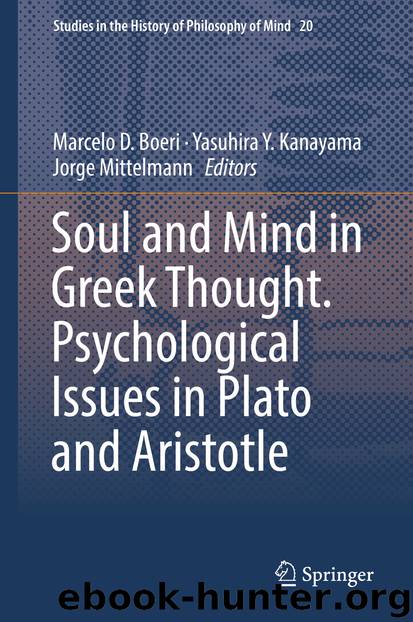Soul and Mind in Greek Thought. Psychological Issues in Plato and Aristotle by Marcelo D. Boeri Yasuhira Y. Kanayama & Jorge Mittelmann

Author:Marcelo D. Boeri, Yasuhira Y. Kanayama & Jorge Mittelmann
Language: eng
Format: epub
Publisher: Springer International Publishing, Cham
6.3 Conclusion
To conclude, I would like to deal again with two questions that have gradually appeared throughout this paper. The first is this: what does it mean to be a slave? In an objective sense, politics of the soul helps us to understand and answer this question. In my opinion, that answer must be directed to the clarification of the relationships, in Plato’s R., between the tripartite doctrine of the soul, the political doctrine of the threefold composition of the city and the radical critique of art in all its expressions, as a mechanism of creation, education and psychological subjection. These relationships can be expressed more clearly by what I will call ‘political truth’ and ‘practical truth’. Plato’s question is an enquiry on truth at the level of human affairs, both public and private: what is a true life? What does a true life consist in? What is the truth of the individual and the polis? It seems to me that, for Plato, a true life is a life free from every kind of slavery in relation to that which is more important to us and which we love of ourselves. The focus of slavery does not lie, then, in a legal aspect, but in a psychological one. The individual identifies himself with the best part of himself, his rational soul. Slavery of the soul is, then, the defeat of the rational part. But that slavery consists also in holding in our inner self an indelible lie not expressed through words: ‘it is truly speaking a lie (ἀληθῶς ψεῦδος)—the ignorance in the soul of the one to whom the lie was told(ἡ ἐν τῇ ψυχῇ ἄγνοια ἡ τοῦ ἐψευσμένου). For a lie in words is a sort of imitation (μίμημα) of this affection in the soul, an image of it that comes into being after it, and not an altogether pure lie. Isn’t that so?’ (R. II 382 b8-c1).
The lie without words of the soul is identified with the character of man: an irreversible stamp derived from an excessive influence of external and unregulated stimuli which produces damaging changes in our inner self. Imitative poetry (in its traditional version) infringes upon the possibility of excellence and psychic justice , because it feeds the inferior part of the soul, producing individuals excessively malleable by the influence of exterior, particular and immediate things and situations. In fact, art is the origin of a corrupt soul because what it reproduces and implants into the individual psyche is the precarious order of becoming in its eternal mutability: shadows and images, contradictory actions of unstable individuals, joy, sadness, laughter and lament. The lie of the soul—slavery—is the uncritical reproduction within the psyche of the immediate reality and, therefore, is an infinite estrangement from Truth and Goodness. It is in this way that we understand the contrast between philosophers and lovers of mere spectacles in Book V. If the city educates men—as Simonides wanted—the city must be educated previously, and its mechanisms of creation, production and distribution of cultural contents must be transformed into rhythmic formats.
Download
This site does not store any files on its server. We only index and link to content provided by other sites. Please contact the content providers to delete copyright contents if any and email us, we'll remove relevant links or contents immediately.
| Ancient & Classical | Arthurian Romance |
| Beat Generation | Feminist |
| Gothic & Romantic | LGBT |
| Medieval | Modern |
| Modernism | Postmodernism |
| Renaissance | Shakespeare |
| Surrealism | Victorian |
4 3 2 1: A Novel by Paul Auster(12377)
The handmaid's tale by Margaret Atwood(7757)
Giovanni's Room by James Baldwin(7330)
Asking the Right Questions: A Guide to Critical Thinking by M. Neil Browne & Stuart M. Keeley(5762)
Big Magic: Creative Living Beyond Fear by Elizabeth Gilbert(5756)
Ego Is the Enemy by Ryan Holiday(5415)
The Body: A Guide for Occupants by Bill Bryson(5082)
On Writing A Memoir of the Craft by Stephen King(4935)
Ken Follett - World without end by Ken Follett(4723)
Adulting by Kelly Williams Brown(4566)
Bluets by Maggie Nelson(4548)
Eat That Frog! by Brian Tracy(4526)
Guilty Pleasures by Laurell K Hamilton(4439)
The Poetry of Pablo Neruda by Pablo Neruda(4098)
Alive: The Story of the Andes Survivors by Piers Paul Read(4023)
White Noise - A Novel by Don DeLillo(4006)
Fingerprints of the Gods by Graham Hancock(3996)
The Book of Joy by Dalai Lama(3976)
The Bookshop by Penelope Fitzgerald(3844)
